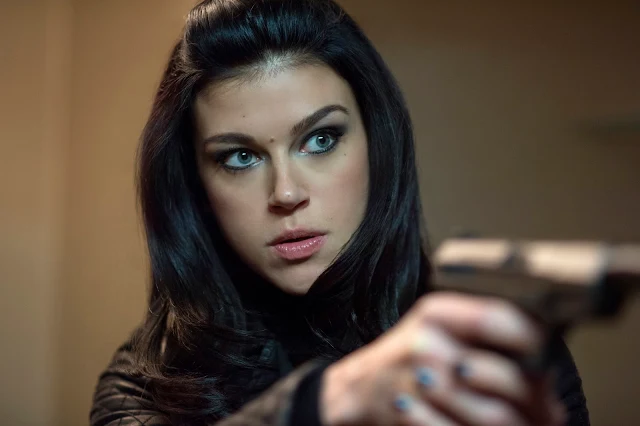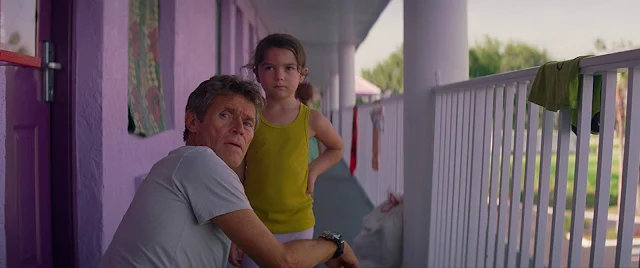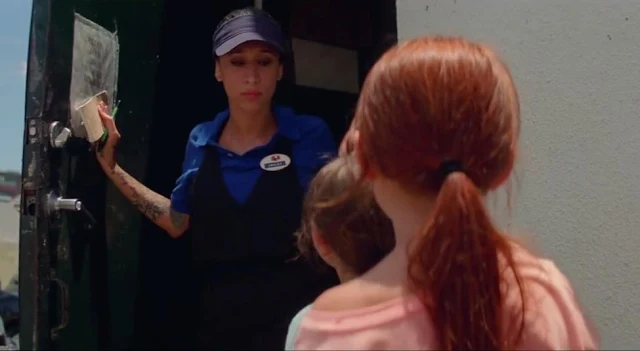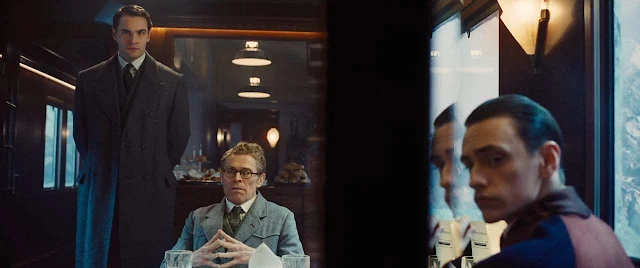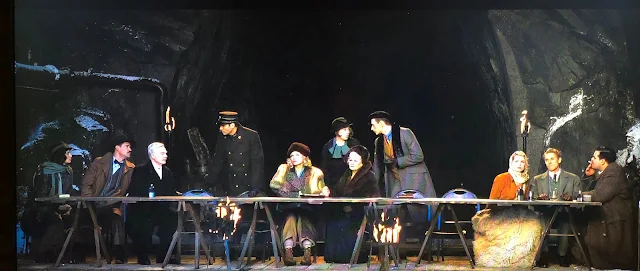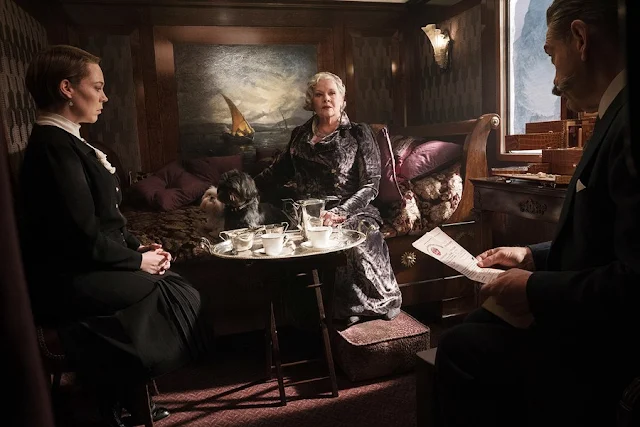 |
| Willem Dafoe in The Loveless |
A blog formerly known as Bookishness / By Charles Matthews
"Dazzled by so many and such marvelous inventions, the people of Macondo ... became indignant over the living images that the prosperous merchant Bruno Crespi projected in the theater with the lion-head ticket windows, for a character who had died and was buried in one film and for whose misfortune tears had been shed would reappear alive and transformed into an Arab in the next one. The audience, who had paid two cents apiece to share the difficulties of the actors, would not tolerate that outlandish fraud and they broke up the seats. The mayor, at the urging of Bruno Crespi, explained in a proclamation that the cinema was a machine of illusions that did not merit the emotional outbursts of the audience. With that discouraging explanation many ... decided not to return to the movies, considering that they already had too many troubles of their own to weep over the acted-out misfortunes of imaginary beings."--Gabriel García Márquez, One Hundred Years of Solitude
Search This Blog
Monday, May 26, 2025
The Loveless (Kathryn Bigelow, Monty Montgomery, 1981)
Monday, February 24, 2025
Nosferatu (Robert Eggers, 2024)
Wednesday, February 12, 2025
John Wick (Chad Stahelski, 2014)
Cast: Keanu Reeves, Michael Nyqvist, Alfie Allen, Willem Dafoe, Dean Winters, Adrienne Palicki, Ian McShane, Lance Reddick, John Leguizamo. Screenplay: Derek Kolstad. Cinematography: Jonathan Sela. Production design: Dan Leigh. Film editing: Elisabet Ronaldsdóttir. Music: Tyler Bates, Joel J. Richard.
Keanu Reeves reminds me of Gregory Peck, another handsome movie star of limited acting range who succeeded by being eminently likable. Just as Peck was miscast as the demonic Captain Ahab of John Huston's Moby Dick (1956), Reeves struggled to play the villainous Don John in Kenneth Branagh's Much Ado About Nothing (1993) -- something about both performers seems to draw a sympathetic response from the audience. That something is certainly needed in John Wick, with Reeves playing a remorseless hit man, though the actor is so innately likable that the filmmakers didn't really need to kill Wick's puppy to elicit audience sympathy. Shoot-'em-up thrillers are so common these days that adding another franchise to the action genre seems like overkill. But what makes John Wick work is screenwriter Derek Kolstad's ability to craft a believable alternate world in which the character can seem plausible. Director Chad Stahelski (and his co-director David Leitch, who was denied that credit by the Directors Guild) manage to create an ambience that evokes both French gangster movies and Hong Kong martial arts films -- Jean-Pierre Melville meets Tsui Hark -- while retaining a peculiarly American love of artillery and automobiles.
Thursday, September 5, 2024
Kinds of Kindness (Yorgos Lanthimos, 2024)
 |
| Margaret Qualley, Jesse Plemons, and Willem Dafoe in Kinds of Kindness |
Cast: Emma Stone, Jesse Plemons, Willem Dafoe, Margaret Qualley, Joe Alwyn, Hong Chau, Mamadou Athie, Yorgos Stefanos, Hunter Schafer. Screenplay: Yorgos Lanthimos, Efthimis Filippou. Cinematography: Robbie Ryan. Production design: Anthony Gasparro. Film editing: Yorgos Mavropsaridis. Music: Jerskin Fendrix.
Sunday, June 2, 2024
Affliction (Paul Schrader, 1997)
Saturday, November 11, 2023
New Rose Hotel (Abel Ferrara, 1998)
 |
| Asia Argento and Willem Dafoe in New Rose Hotel |
Cast: Christopher Walken, Willem Dafoe, Asia Argento, Annabella Sciorra, John Lurie, Kimmy Suzuki, Miou, Yoshitaka Amano, Gretchen Mol, Phil Neilson, Ken Kelsch, Ryuiki Sakamoto. Screenplay: Abel Ferrara, Christ Zois, based on a story by William Gibson. Cinematography: Ken Kelsch. Production design: Frank DeCurtis. Film editing: Jim Mol, Anthony Redman. Music: Schoolly D.
Abel Ferrara's New Rose Hotel is more an exercise in style than a satisfactory movie. The plot is simple: Fox (Christopher Walken) and X (Willem Dafoe) are agents for a Japanese technology firm plot tasked with raiding a top scientist from a German company. They do so by hiring a beautiful prostitute called Sandii (Asia Argento) to seduce the scientist, whom they will set up in a laboratory in Marrakech. The plot goes awry when one of the agents falls in love with Sandii and overlooks some evidence that she may be working for the German company, putting the agents in danger. Padding this plot into a 93-minute movie means a lot of filler, including an extended opening scene set in a kinky nightclub where some lugubrious songs get sung and the necessary exposition gets spilled. Then there are some irrelevant sex scenes while the scheme is being set up, and after it fails there are extended flashbacks that add little to our understanding of what has happened. The three leads are capable and watchable, but the film leaves us with no revelations about corporate rivalry in the age of technology that we haven't seen in better movies.
Friday, August 21, 2020
The Reckoning (Paul McGuigan, 2002)
 |
| Willem Dafoe and Paul Bettany in The Reckoning |
Nobody, I think, sets out to make a mediocre movie; they just happen to turn out that way. Certainly, the makers of The Reckoning must have had hopes of excellence when they hired such fine actors as Willem Dafoe, Brian Cox, Vincent Cassel, Matthew Macfadyen, and a 20-something up-and-comer named Tom Hardy. The story they wanted to film came from Morality Play, Barry Unsworth's novel, which was short-listed for the Man Booker Prize, about the theater in medieval England as it edged away from dramatized Bible stories into secular material, mixed with a murder mystery solved by a renegade priest. Unfortunately, The Reckoning is something of a mess, starting with the priest, Nicholas (Paul Bettany), cutting off his hair and escaping through the woods after being discovered in flagrante with a married woman, whose husband he killed in the ensuing melee. On the road, he encounters a troupe of traveling players headed by Martin (Dafoe) and persuades them that he would be an asset to their company. They go to a village by the castle of Lord De Guise (Cassel) where the trial of a woman accused of killing a teenage boy has just concluded with her conviction and sentence to be hanged. One thing leads to another as Nicholas becomes involved with proving the woman's innocence and exposing De Guise as a murderous pedophile, dragging not only the acting troupe but also the villagers into his exposé. The narrative is muddled by too many unnecessary flashbacks into Nicholas's past, by the intervention of a character known only as "the King's Justice" (Macfadyen), and by a half-hearted attempt to strike up a romance between Nicholas and the woman accompanying the acting troupe, Martin's sister, Sarah (Gina McKee). The brightest moment in the movie comes when the players perform their version of the story of Adam and Eve, with Hardy's Straw, the actor tasked with playing women, as Eve in a sort of bare-breasted body suit and a ropy blond wig. He looks a little like Botticelli's Venus in the get-up. If The Reckoning had more moments like that, and less of the mystery-solving plot, it might have been a better movie, but as it is, the mise-en-scène is cluttered and gloomy and the action unconvincing.
Monday, May 4, 2020
The Lighthouse (Robert Eggers, 2019)
 |
| Willem Dafoe and Robert Pattinson in The Lighthouse |
Two men arrive on a lonely, deserted, rocky island where they take over the maintenance of a lighthouse. They proceed to drive each other into madness and death. That pretty much sums up The Lighthouse, a psychological drama with horror movie tinges. Clearly, to make such a simple story work, you need topnotch actors and good dialogue, camerawork, design, music, and editing. The Lighthouse succeeds in all these areas. Willem Dafoe is already established as one of our best actors, and Robert Pattinson has been building an exceptional career since coming out of the shadow of the Twilight movies. Jarin Blasche's cinematography, which works with an almost square frame, even tighter than so-called "Academy ratio," won him an Oscar nomination, and all the other elements work to build a sense of loneliness, isolation, and claustrophobia, of things closing in on the two men. So why do I feel it doesn't quite add up to the sum of its excellent parts? Perhaps because the course of the narrative is so obvious from the outset. Its opening scenes, the arrival at the lighthouse and the establishment of the characters, reminded me of those Ingmar Bergman films set on Fårö island. But where Bergman can turn weirdness resulting from isolation into a statement about humanity, Robert Eggers doesn't give us much beyond the spectacle of two only roughly civilized men disintegrating into savagery as they unmask each other's secrets and suffer from dreams and hallucinations. Still, if that's the kind of thing you want -- or feel you need -- to watch, there's not a much better portrayal of it than The Lighthouse. It might make for provocative viewing, come to think of it, in a time of quarantine and social distancing.
Friday, February 7, 2020
At Eternity's Gate (Julian Schnabel, 2018)
 |
| Willem Dafoe in At Eternity's Gate |
Sunday, September 29, 2019
Aquaman (James Wan, 2018)
Aquaman (James Wan, 2018)
Cast: Jason Momoa, Amber Heard, Willem Dafoe, Patrick Wilson, Nicole Kidman, Dolph Lundgren, Yahya Abdul-Mateen, Temuera Morrison, Ludi Lin, Michael Beach, Randall Park. Screenplay: David Leslie Johnson-McGoldrick, Will Beall, Geoff Johns, James Wan. Cinematography: Don Burgess. Production design: Bill Brzeski. Film editing: Kirk M. Morri. Music: Rupert Gregson-Williams.
I sometimes feel with the comic-book-sourced superhero movie that we have moved not just into a separate genre but into an entirely separate medium: a fusion of video games, technology, and neo-mythology that's something other than traditional cinematic storytelling. Any auteur-theory criteria that we might apply to the movies we knew and loved are irrelevant when the number of credited people who worked on a film runs into the thousands. Aquaman is an artifact, meant to have its two-and-a-half hours experienced in the most technologically advanced venue possible, as a kind of Gesamtkunstwerk -- wouldn't Richard Wagner have been happy to have CGI and Dolby sound and Imax and 3-D for his Ring? From time to time we glimpse remnants of the old conventional cinema in Aquaman: engaging performers like Jason Momoa and Willem Dafoe and Nicole Kidman (who seems to be everywhere -- when does the woman sleep?). But their puny human efforts are swamped by the technology, so much so that we hardly care about their characters when computer-generated things are zooming and whizzing in every direction. Sometimes the humans are taken over physically by the computer, which makes them look younger (Dafoe) or brawnier (Momoa) than they are in reality. Which is all just to say that I enjoyed Aquaman as whatever it is, but I kind of hated it as a movie.
Thursday, March 28, 2019
The Florida Project (Sean Baker, 2017)
The Florida Project (Sean Baker, 2017)
Cast: Brooklynn Prince, Bria Vinaite, Willem Dafoe, Christopher Rivera, Valeria Cotto, Aidan Malik, Patti Wiley. Screenplay: Sean Baker, Chris Bergoch. Cinematography: Alexis Zabe. Production design: Stephonik Youth. Film editing: Sean Baker. Music: Lorne Balfe.
Saturday, March 16, 2019
Murder on the Orient Express (Kenneth Branagh, 2017)
Murder on the Orient Express (Kenneth Branagh, 2017)
Cast: Kenneth Branagh, Daisy Ridley, Leslie Odom Jr., Tom Bateman, Penélope Cruz, Josh Gad, Johnny Depp, Derek Jacobi, Michelle Pfeiffer, Judi Dench, Olivia Colman, Willem Dafoe. Screenplay: Michael Green, based on a novel by Agatha Christie. Cinematography: Haris Zambarloukos. Production design: Jim Clay. Film editing: Mick Audsley. Music: Patrick Doyle.
Saturday, November 18, 2017
Antichrist (Lars von Trier, 2009)
 |
| Willem Dafoe and Charlotte Gainsbourg in Antichrist |
She: Charlotte Gainsbourg
Nic: Storm Acheche Sahlstrøm
Director: Lars von Trier
Screenplay: Lars von Trier
Cinematography: Anthony Dod Mantle
Production design: Karl Júlíusson
Film editing: Åsa Mossberg, Anders Refn
Any film that begins with a toddler climbing to an upper-story window and falling to his death while his parents have graphically photographed sex has a lot of work cut out for it. Unfortunately, Lars von Trier isn't up to the task he sets for himself: Antichrist is morally and intellectually confused in ways that even arch-provocateur von Trier's earlier films haven't been. It plays like a horror film directed by Andrei Tarkovsky (if Tarkovsky had been a less grounded and imaginative director), which shouldn't be surprising since the film's credits include a "horror film researcher" and is dedicated to Tarkovsky, whose film The Mirror (1975) reportedly served as a direct inspiration for von Trier. Antichrist became a cause célèbre when it was shown at Cannes, where some people reportedly fainted and others walked out, but Charlotte Gainsbourg went on to win the best actress award. American critics were similarly divided, with A.O. Scott of the New York Times calling it "ponderous" and "conceptually thin and ... dull" but Roger Ebert praising both the commitment of the actors and the director's drive "to confront and shake his audience more than any other serious filmmaker -- even Buñuel and Herzog." Some critics had it both ways, praising it with reservations: Tom Long of the Detroit News labeled it "probably the best film ever that you'd recommend to absolutely no one." Ebert's measured praise seems to me the most appropriate: Gainsbourg and Willem Dafoe are the main reasons anyone who is fascinated by the art of acting should see Antichrist. They throw themselves into near-impossible roles, full of contradictions and sometimes misconceived ideas about psychotherapy and the relationship between men and women, and yet manage to overcome the limitations of the screenplay. And while I would never mention von Trier in the same breath as Tarkovsky or Buñuel (Herzog, maybe), I can't help feeling that there is an immense talent at work in his films. Antichrist was born out of von Trier's period of clinical depression, and while that's not enough to excuse the film's incoherence, it certainly makes it more interesting as a personal work of art.










